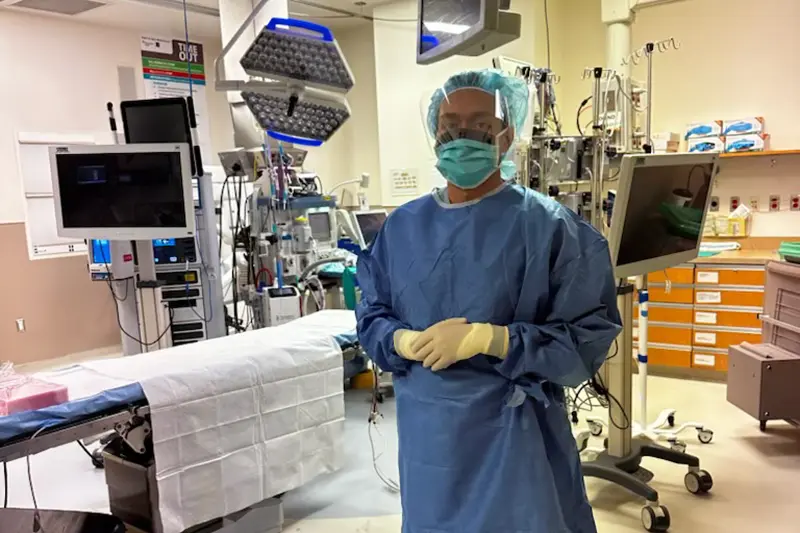This past summer, Nehemiah Rao ‘23, a recent Biochemistry graduate, had the opportunity to intern in the DeBakey Summer Surgery Program through Baylor College of Medicine. This school is in the Texas Medical Center, the largest medical center in the world.
Rao described the program as a great opportunity to get exposed to surgery and what it’s like to be in medical school. “You interact with so many types of doctors, surgeons, anesthesiologists, doctors in the ICU, nurses, fellows, and med students,” he said. “I got to know so much about different professions and positions within the medical field just from the program.”
An Interactive Surgical Program
After shadowing family medicine, Rao realized that was the career path he wanted to take.
Rao’s father had done the DeBakey Summer Surgery Program in Houston, TX, when he was Rao’s age, and he encouraged Rao to apply.
Rao was one of only 15 students accepted out of about 200 applicants. During the eight-week program, Rao was involved in an interactive surgical shadowing experience.
“The first week, you meet with physicians and get to know your team because surgeons work as a team,” Rao said. “I showed up the first week, met the physician, and learned to scrub in. You are introduced to the program, then they drop you off at your respective hospital where you get two rotations.”
The rotation options included transplants, cardiovascular surgery, plastic surgery, bariatric surgery, and thoracic surgery. Rao was at Baylor St. Luke’s Medical Center, where his first rotation was cardiothoracic surgery (open heart surgery), then thoracic surgery (robotic surgery).
The Day at a Glance
Rao would wake up at 4:30 am, do rounds with his surgical team at 6 am, meet the case (the patient being operated on that day) at 8:30 am, then help nurses and other technicians prep the patient or just shadow the process.
Rao would scrub in with the fellow and the surgeon for the operation, which can take four to five hours depending on the case. When the surgery ended, Rao would help the team get the patient into the ICU. Then, he repeated the whole process for two to three more cases before going home around 6 pm. This was his schedule for five days each week for eight weeks.
Rao’s team offered flexibility for him to come and go as desired, so he was able to observe and/or scrub into a wide variety of surgeries. One of the surgeons Rao worked with was one of the top aortic surgeons in the country, so he was able to observe aortic operations as well as coronary artery bypass surgeries.
“Having that knowledge was really helpful,” Rao said. “It’s going to be something I’ve already been exposed to going into med school.”
The program also gave twice-a-month lab classes about how to perform tasks such as how to suture, how to knot tie, and more.
Outside of the hospital, the program would give two lectures per week. Instructors spoke on topics like conducting research in medical school, the acceptance process, and what it’s like to be a medical student. The program would also invite students to the yearly Research Day, a two-day conference where medical students and surgeons give research presentations.
Early Exposure to Medicine
“It was a really good opportunity to get exposure to medicine,” Rao said. “The clinical experience you get in that program is stuff that medical students are just starting to see. You’re doing stuff that medical students are doing as an undergrad student. And it’s extremely difficult to get experience like that outside of a program like that.”
Rao also explained the importance of a program like this in terms of applying to medical school after college.
“Not only are you getting clinical experience, you’re going to stand out when you’re applying for med school because you’ve already had all this experience,” he said. “How many undergrads that are applying to medical school have scrubbed in with surgeons? The connections you form, not only with the surgeons but also Baylor College of Medicine as a whole, are extremely beneficial as you go into your application process.”
At Taylor and Beyond
During his time at Taylor, through the Invitation Program, getting involved with the American Chemical Society, and joining Latino Student Union, Rao experienced professional development for his future career and personal development through an intentional community with like-minded hearts for Christ.
For the next few months following his recent December 2023 graduation, Rao is spending his time studying for the MCAT and working as a patient care technician at his local hospital.
Prep for Your Medical Career
In Taylor’s Pre-Med Curriculum, you’ll learn how you can get a head start in experience before medical school. In the last two years, 96% of students who successfully complete Taylor’s Pre-Med Curriculum are accepted into professional schools to study medicine, dentistry, or veterinary medicine.
Pre-med students have opportunities for clinical experience, cross-cultural experience and classes, leadership, missions trips, research, shadowing, and volunteer opportunities. Check out our majors with a pre-med emphasis and schedule a visit to see how Taylor can prepare you for a successful medical career!

